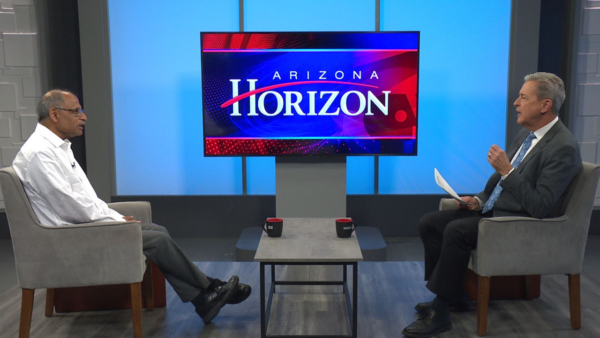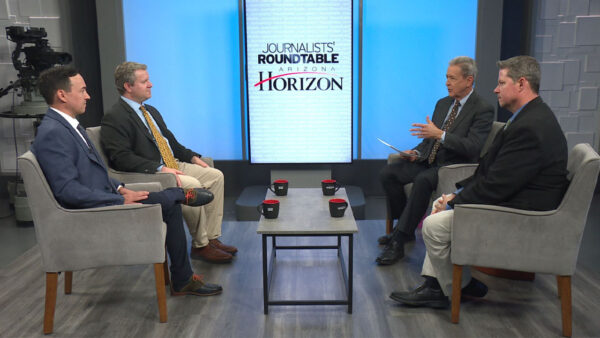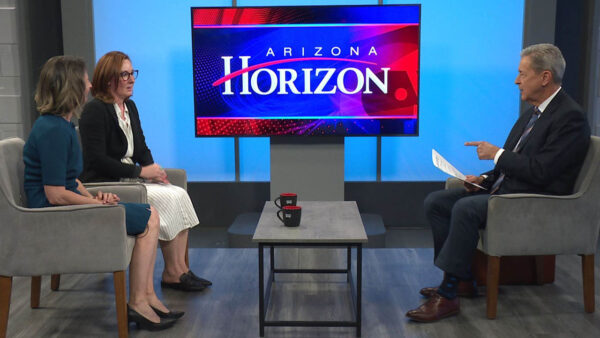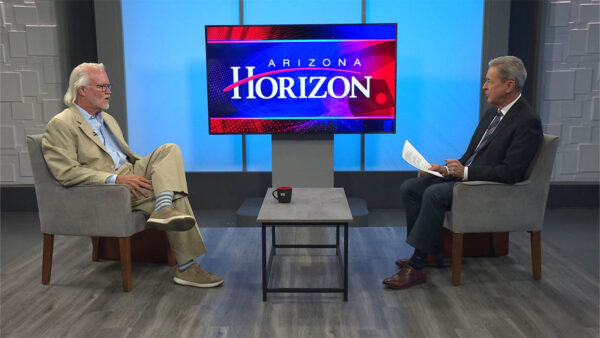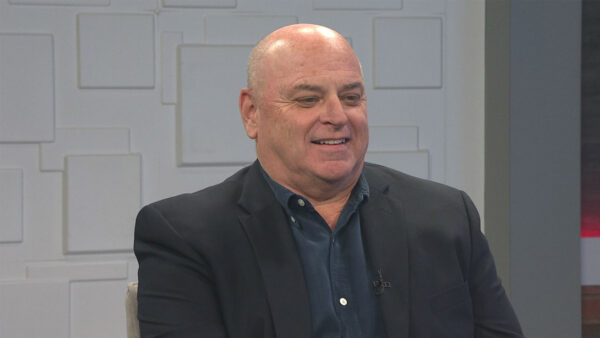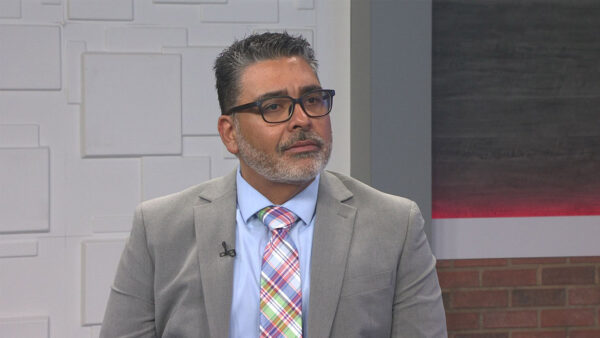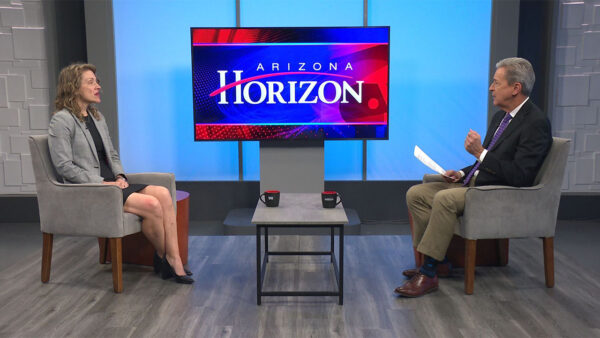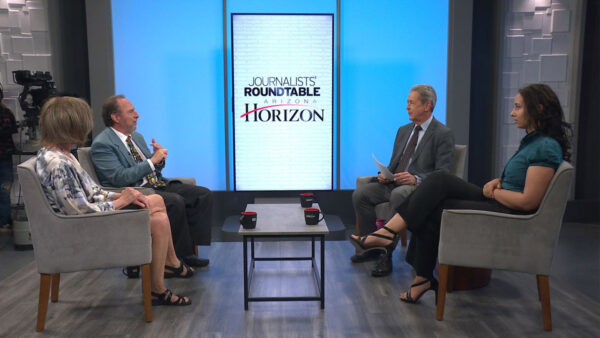Legal and immigration experts respond the U.S. Department of Justice lawsuit challenging the constitutionality of SB 1070. Guests include ASU immigration law professor Evelyn Cruz and ASU justice and social inquiry professor Doris Marie Provine.
Ted Simons: The U.S. justice department yesterday filed suit against Arizona's new immigration law, claiming that the law is unconstitutional. The suit claims that Arizona is trying to take on the role of the federal government in creating immigration law. Here to talk about the legal aspects of the action is Evelyn Cruz, a clinical law professor and director of the immigration law and policy clinic for ASU's Sandra Day O'Connor college of law. Also here is Doris Marie Provine, a professor for justice and social inquiry. Dr. Provine is a political scientist and a lawyer who has been researching policies surrounding illegal immigration. Good to have you both on "Horizon."
Evelyn Cruz: Thank you for having us.
Ted Simons: That background for the -- the background of the suit, that's pretty much what the justice department is claiming, that Arizona is taking on federal responsibility?
Evelyn Cruz: Correct. It's arguing that the federal government should be in charge of how we proceed with our immigration policies. And the state of Arizona is impeding on their ability to carry out the national policies that they have set for themselves and what priorities they have in enforcing immigration laws.
Ted Simons: Among the concerns, Marie, would be a patchwork of laws not good for anyone.
Doris Marie Provine: Certainly that's a big one. And it's been mentioned both by the president and it's in the brief itself that, but I think the key word is discretion that the federal government would like to maintain its discretion to enforce federal immigration law the way it sees fit. And that includes allowing exceptions in some cases, and having new enforcement that reflects other values, for example, humanitarian concerns when there is a situation of abuse and wanting to protect a witness who might be an unauthorized immigrant, but might also be a valuable source of information for a criminal conviction.
Ted Simons: It sounds like priorities, law enforcement priorities also mentioned in this suit as well. That's what Marie was saying. Discretion, priorities, all a play here?
Evelyn Cruz: Correct. The federal government already has agreement was most -- with a number of different jurisdictions regarding checking on the status of immigrants. One of the things they have is the national database in which officers can call in and find out if a person is legally in the United States or not. And that program has been in operation for a number of years. The statute in Arizona speaks to use that program to aid it in enforcing 1070, and the federal government's concern that it's going to be overwhelmed with calls from Arizona and not be able to serve other priorities such as handling the call from an officer who has an individual who has commit add serious crime, the -- versus having someone who just had a traffic ticket.
Ted Simons: Is that one of the reasons law enforcement, or just enforcement of this particular rule, is not a singular goal of federal immigration policy? Because you know, enforcement does not seem to be a priority at the federal level like some in Arizona wish it were.
Doris Marie Provine: Well, there's quite a bit of enforcement going on. There are -- what is it, about 300,000 people in detention at this moment under federal supervision. There's certainly active enforcement occurring at the border as the sheriffs in Arizona and other states have said. And there are actions that actually pull people who have been living in the interior of the United States out and encourage them to deport voluntarily or put them in removal proceedings. So I would disagree with the argument that there's no enforcement going on. There's quite a bit of enforcement going on. But as we said earlier, it's a question of who's going to do the enforcing, and at the local level, there's some resistance to being part of that. What Arizona has done is it has basically mandated that local law enforcement get involved to the maximum extent possible in enforcing -- and prioritizing immigration enforcement above everything else. That's one of the reasons you see some local police departments, local police chiefs and even actually officers, there are a couple who have brought suit against the state because they think this is a big mistake for them.
Ted Simons: I notice as well reading up on this Congress decided against criminal sanctions against those looking for work in terms on the federal level. That is yet another nuance as we've discussed earlier, that separates federal law from what Arizona is trying to do. Correct?
Evelyn Cruz: Right. The federal law has criminal and civil ramifications to a person in the United States illegally. The majority of them are civil. Relating to working with documents that are false, you can have a civil and a criminal finding, but most of the time the fact you're in the United States illegally is going to be a civil violation. And so that is different -- that difference the federal government has created is part and parcel of the policy of dealing in -- with a large issue by parceling it out into those things they feel are severe enough they should be criminalized, and those other issues that are important but do not present imminent danger to the general population, and therefore are civil.
Ted Simons: We had the Phoenix police chief here, and his concern here was that the law makes him arrest for a criminal offense something that is a federal often times a federal civil offense. If he doesn't arrest, he can be put to task by the citizens of Arizona.
Doris Marie Provine: He could be sued.
Ted Simons: If he does, he violates federal law.
Doris Marie Provine: Well, he is contradicting federal law. In a sense, what Arizona has done has create add crime where nonexisted, as Evelyn was saying. And it also forcefully rearranges the priorities of police departments. And that's one of the reasons chiefs are against it. Most chiefs these days are really advocates of community policing, and they see their own success in making a community safe in terms of having everyone in the community who was there, including people who don't have any right to be there, willing to call the police in an emergency or if they seek criminal behavior. And so this puts police who believe that that's the way to get community safety into a really awkward position, because now they've been kind of drafted against their will, some of them, as immigration agents. So you can imagine why this is controversial at that level.
Evelyn Cruz: And the federal government has to advocate it to that community policing, creating programs for individuals who assist in the prosecution of violent crimes, creating visas for those individuals. Now we have a situation in which the different police departments fear that they cannot utilize those Visas to get witness as to participating a criminal prosecution of a severe crime.
Ted Simons: We've talked a little bit about this kind of, touched on this, but for those who hear supremacy clause, who hear preemption, the commerce clause, obvious lay a big factor in this suit. Quick definitions for us.
Evelyn Cruz: The supremacy clause is in the constitution, article five, that says the federal government is the supreme law of the land. What that means is that the states have to follow laws that the federal government creates, that affect -- the 48 states. The 50 states, sorry. Just remembering a case in my head. At that point it was 48 states. It's 50 states. And what is said that either Congress has specifically spoken to the issue, we will do X, Y, and Z, don't touch it, in immigration they haven't done that ever. They could have feel preemption, meaning they have a complex, comprehensive system that addresses the issue at hand, or they can have a situation when there's a conflict, that the state can act in it, but not in a way that interferes with the federal interest that they're trying to protect.
Doris Marie Provine: It's really pretty straightforward as a concept. It's kind of like what families do. I'll take care of that, no, I'll take care of that, and we've got a federal constitution that divides things up and gives local states and cities and towns for that matter power to make a lot of kinds of law, but it also reserves certain things to the federal government. And there's not a lot in the constitution that spells this out, so your ordinary person might not see it right away. But the federal government was given the power to terminallization, who gets to be a citizen, and who doesn't. And the court thes have expanded that to say in immigration the federal government has preempted most of the authority with just a little bit left in a few exceptional situations to the localities.
Ted Simons: Very quickly A. couple of questions here. Why can't local law enforcement enforce federal law?
Doris Marie Provine: Well, we go back to that issue of discretion. And if you have an agency, an agencies that have their own policies for making certain things happen, for example, a state department is involved in diplomatic relations, and as Evelyn was mentioning there are issues of serious crimes where other kinds of Visas or even just protecting someone might be in the interest of our government, then having someone else come in and attempt to take over that area causes -- could cause problems. Plus, as Evelyn mentioned earlier, there's the whole issue of how many resources are going to be devoted just to Arizona. We've done pretty well with border guards, but are we going to be able to demand that kind of attention for the interior of the state as well?
Ted Simons: And their there are foreign policy issues as well. Last question, supporters of 1070 say it's just Arizona doing what the feds won't do. Is that a legal argument in this case?
Evelyn Cruz: Unfortunately you have to be able to show that they have a right to do so. You cannot use the -- a law to proceed with a political agenda. It has to be grounded on a basis in the constitution or in any act of Congress that states that the -- that they can do so. The state has been given the ability to enforce some immigration laws through agreements, but -- the agreement was Maricopa County to look into the status of individual who's are in the jails is one of those examples. However, the state can then turn around and say, OK, we're going to get ourselves involved in this. It's dangerous for the cohesiveness of the country.
Ted Simons: All right.
Doris Marie Provine: Bottom line, Arizona is doing something the federal government doesn't want to do, and the federal government is doing something Arizona doesn't want it to do.
Ted Simons: All right. That's a good enough place to stop. Thank you so much for joining us. We appreciate it.
Evelyn Cruz:ASU immigration law professor;Doris Marie Provine:ASU justice and social inquiry professor;






